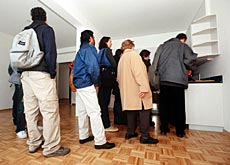Switzerland moves towards concrete jungle

Every year 29 square kilometres of Swiss land is built on, despite planning laws aimed at keeping new construction in check.
Now the federal authorities are trying to impose restrictions on the cantons to prevent the urbanisation of Switzerland’s countryside.
Environmentalists say construction work is taking place everywhere, in particular on green meadows, and often without any consideration for the landscape.
They claim developments of family homes are springing up across the country, blurring the distinction between town and country.
About 70 per cent of the population now live in built-up areas, of which a small percentage live in the cities.
Garden gnome syndrome
The urge to have a little house in the country reflects the “desire to live in a garden-gnome idyll”, says Fritz Wegelin, deputy director of the Federal Office for Spatial Development.
But this idyll is nothing but an illusion, according to Benedict Loderer, editor of architecture magazine “Hochparterre”.
“Even though they insist on living in the country, people in the agglomerations live in an urban way,” Loderer said.
The experts agree that the attempt to use country planning to prevent the worst construction sins has failed.
“It’s obvious that efforts to control development have not worked,” said the Office’s Fred Baumgartner.
Calls are being made on the government to tighten control and bring cantons and communes into line.
Cantonal autonomy
The Office for Spatial Development says cantons and local authorities follow their own guidelines and rarely concern themselves with planning directives from the federal authorities.
The Office has already started formulating proposals to deal with the problem, which should be put before government and parliament next year.
Today, responsibility for planning and construction laws lies mainly with the cantons and communes – central government only formulates legal frameworks.
This feature of Swiss federalism has led to an unwieldy mass of norms, definitions and concepts, with every canton and commune planning and building without reference to the regional needs and requirements.
“We simply don’t have an overview of what’s going on,” comments Wegelin.
As long as Switzerland’s 26 cantons pursue their own construction policies, he argues, a well thought-out national land development strategy cannot be achieved.
Calls for centralisation
Raimund Rodewald, of the Swiss Foundation for the Protection of the Countryside, says he would welcome greater centralisation of urban planning and construction.
“We have been calling for the centralisation of these processes for years,” he says.
“[Because] decisions about the sustainable use of land and about restrictions on construction need to be taken at a national level.”
Rodewald’s view is shared by Martin Lendi, emeritus professor at the Federal Institute of Technology in Zurich and an expert in spatial development.
He argues that it should not be up to individual cantons to set their own planning regulations.
“The fact that we share the same space means that we should also have the same laws on what we do with this space.”
swissinfo
The Federal Office for Spatial Development is trying to curb building in rural areas of Switzerland.
It is formulating proposals to stop cantons and communes from independently deciding what can be built where.

In compliance with the JTI standards
More: SWI swissinfo.ch certified by the Journalism Trust Initiative










You can find an overview of ongoing debates with our journalists here . Please join us!
If you want to start a conversation about a topic raised in this article or want to report factual errors, email us at english@swissinfo.ch.